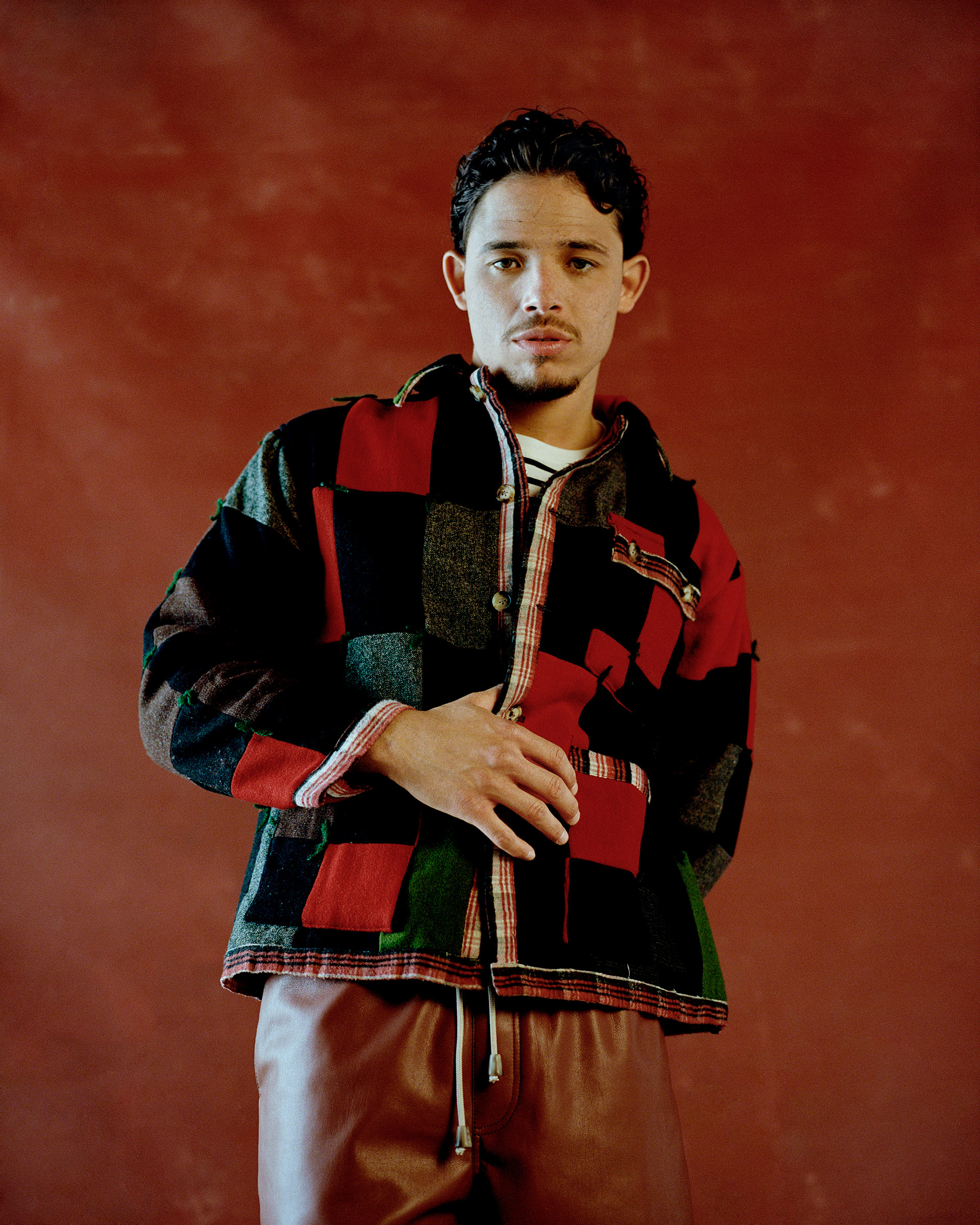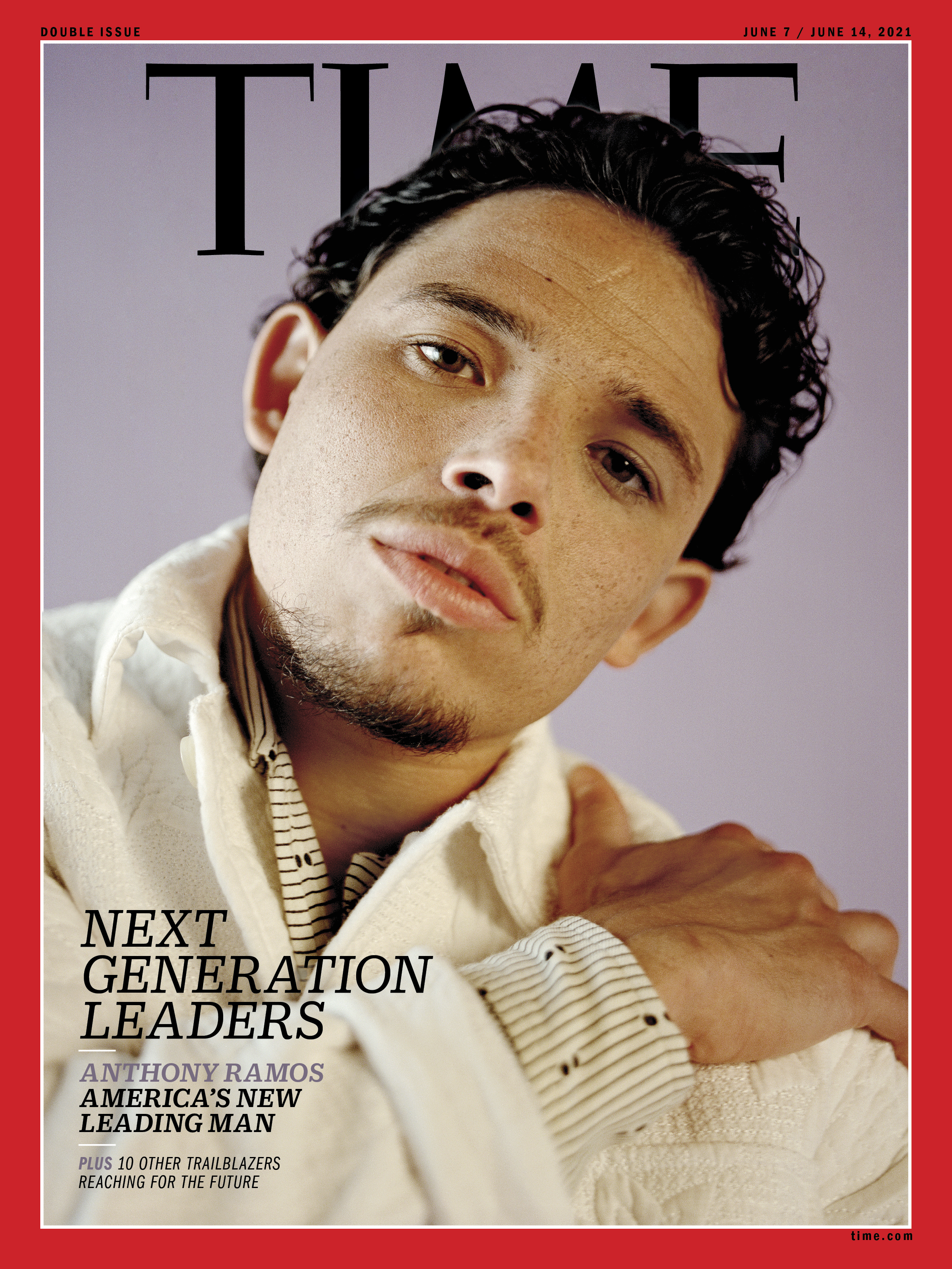Anthony Ramos does a lot of things well, but sitting still is not one of them. The performer has spent his 29 years in constant motion: scrounging for dollar slices in Brooklyn as a kid, schlepping across America on musical theater tours, staying up all night writing songs after eight-a-week Hamilton performances, chasing casting directors into elevators. “That’s always where my head’s at: think fast, make moves, bop bop bop bop bop,” Ramos says over a Zoom call in May.
In fact, the only reason that Ramos is stationary during our interview is because he’s being forced to. Ramos is on a 14-day quarantine in Montreal before he lunges into his next major project: playing the lead in the untitled next Transformers movie. While confined to his Airbnb, Ramos is, of course, already animatedly looking toward the future: gaming out his role in reshaping a formula-driven franchise known mostly for its explosions; putting final touches on his second pop-R&B album and envisioning the concert tour to follow.
But before any of that happens, Ramos will be introduced to millions when In the Heights, one of this summer’s most anticipated blockbusters, premieres in theaters and on HBO Max on June 11. The Warner Bros. film, directed by Jon M. Chu and adapted from Lin-Manuel Miranda’s and Quiara Alegría Hudes’ Tony-winning 2008 musical about a community bursting with culture and drama in upper Manhattan, represents a full-circle moment for Ramos. It’s a neighborhood story that conjures his own upbringing. It’s the show that, when he saw it as a teen, convinced him he had a place in a theater world sorely lacking in Latino representation.
And it sees Ramos stepping into the shoes of his mentor Miranda, who was meant to play the lead role of Usnavi—a hardluck bodega owner with dreams of returning to the Dominican Republic—a decade ago, before the film slipped into development hell. The battles Miranda and others fought in that time resulted in a moment in which a face like Ramos’ can be that of a leading man’s—and Ramos hopes to do the same for a new generation. “That’s what I’m most grateful for: to be a part of a story that opens the door for many more stories,” he says. “People of color telling their stories on a big stage is something that we just haven’t had, for forever.”
When Ramos was being raised in a Bushwick housing project by a single Puerto Rican mother of three, his aspirations were less about changing the world than getting his next meal. “It was survival, really,” Ramos says. “We had days where we didn’t have hot water, when we were about to be evicted. I had to be resourceful: ‘I asked Jean for a quarter yesterday, so maybe I can ask Miss Helen next door for one.’”
But Ramos says this upbringing gave him a hunger—“literally and figuratively”—that would serve him well in the relentless world of show business. Plus, what his family lacked financially was offset by the surrounding richness of culture. “There were Jamaicans, Trinidadians, Puerto Ricans, Dominicans, so the food was always good. The music was always playing; there’s a pulse in the streets,” Ramos recalls. “It wasn’t the easiest all the time, but it never lacked adventure or exploration.”
As a teenager, Ramos struggled with what career path to take; he considered baseball and the Navy before a teacher who watched him in school musicals convinced him to apply for the American Musical and Dramatic Academy (AMDA) and helped secure him a free ride. At that point, Ramos was ambivalent about the theater world, as its stories and formalities rarely resonated with him. “I didn’t even like musicals like that,” Ramos says. “That was just the only school I had to go to.”
In 2011, AMDA gave its students free tickets to Miranda’s In the Heights, which had captivated Broadway partially because of how different it was from the status quo. (The New York Times wrote in 2008 that its “dancing rhythms of salsa and Latin pop” were “an ear-tickling novelty.”) Initially, Ramos was slightly skeptical, because he had seen how the few Latino students at his school had been immediately pigeonholed into singing In the Heights numbers in class. But when he went to see it, he was blown away. The characters talked like the people he grew up with and embraced the same blend of hip-hop, salsa, bachata and pop blasting from car windows. Its themes of family, gentrification, multiculturalism and hustle spoke to him like no Golden Age Musical had. “Everybody on the stage felt like someone I knew on a personal level,” he says.

Buoyed by the show, Ramos graduated that year and hit the ground in auditions, but his enthusiasm was not reciprocated. The pock-marked, code-switching performer wasn’t exactly what casting directors were looking for. “People were like, He speaks like he’s from a barrio. We don’t know what to do with this guy.” Ramos even auditioned for the In the Heights national tour in front of Miranda and his brain trust, and failed to land a spot. “I am sorry to say I have no memory of that,” Miranda says, laughing. “I don’t know what was in the Wheaties between 2011 and 2014.”
Over those years, Ramos would scrape by with minor gigs: a New Jersey Grease production; a Damn Yankees tour that saw him performing 67 cities in three months and eating Little Caesar’s on the side of the highway. In 2012, he secured the role of Sonny, Usnavi’s teenage cousin, in a Salt Lake City production of In the Heights, only after following the casting director into an elevator and begging him to take his headshot. He was still agentless when he showed up to an open call for some kind of musical about the founding fathers in 2014. Despite his unpolished state, Miranda this time saw something in him and cast him in the dual role of John Laurens and Hamilton’s son Philip. “He had this hunger; the way he delivered the material felt very life or death for him,” Miranda says. “If it weren’t my show, I’d be like, ‘This guy should be leading the revolution of Les Misérables.’”
And when given his shot, Ramos did not throw it away. As Laurens, he served as one of Hamilton’s foremost energizers, imploring the audience to “shout it to the rooftops!” Record after Broadway ticket record shattered during Ramos’ greuling year-plus run on the show, but for Ramos, it was just his day job. “I’d be in Hamilton until 11 o’clock, write music ‘til like two or three in the morning,” he recalls. “Get up at eight or nine, do an audition in the morning, get my day poppin’ and then do the show again.”
This relentless work ethic landed him several marquee roles, including the best friend to Lady Gaga’s Ally in A Star Is Born and as Spike Lee’s hyperkinetic character Mars Blackmon in the Netflix reboot of She’s Gotta Have It. (His work also led him to meet his now-fiancée, fellow Hamilton cast member Jasmine Cephas Jones.) Meanwhile, Ramos was also kickstarting a solo pop career that would result in him signing with Republic Records, the home of Ariana Grande and The Weeknd. He plans to release his second album, Love and Lies, on the label this summer.
While Ramos has more than proven his versatility as a performer, he is ecstatic that his biggest role yet hits so close to home. “I relate to Usnavi in so many ways: growing up Latino in New York, with so many dreams but also the reality of living paycheck-to-paycheck,” Ramos told me on the In the Heights set in Brooklyn in 2019. There, Jon M. Chu filmed Ramos in a tiny bodega set, with Rica boxes and Jumex cans lining the walls. Despite the cramped quarters, Ramos was visibly at ease, roughhousing with other cast members between takes. “We made this movie with a lot of love, man,” he says.
For many years, it seemed doubtful the movie would even get made. The musical was optioned shortly after it won Best Musical at the 2008 Tony Awards. But studios were reportedly hesitant to allocate a budget surpassing $37 million without bonafide stars like Jennifer Lopez or Shakira. Miranda, meanwhile, had aged out of the role and was moving on to Hamilton.
But the ensuing fervor around Hamilton only re-energized interest in Miranda’s prior project, giving him and newly attached director Chu—who was about to catapult into the stratosphere himself with the $238 million-grossing Crazy Rich Asians—the upper hand in negotiations. “We got to go in with our own terms: to cast it however we wanted and for Lin to get the final cut,” Chu says. “Those are things they don’t just give to regular people.” The film rights were picked up by Warner Bros in 2018.
With creative control in hand, Miranda was more than happy to relinquish a role that had become synonymous with him. “I always say about Usnavi that I fell in the snowball as it rolled down the hill,” Miranda says. “It was hard to get anyone to learn all of those raps for a 29-hour equity meeting, so it was like, ‘I’ll just do that part.’ Spiritually, I’m much closer to [the character of] Nina,” who is played by Leslie Grace in the movie.
In 2018, Miranda saw Ramos fill in at the last minute as Usnavi at a weeklong run at the Kennedy Center rendition of the musical. “I had this weird vision of like, ‘I played Usnavi but he is Usnavi,’” Miranda says. “He is that community leader and heartbeat in a very tactile way.”
Chu felt the same after meeting with Ramos for coffee around the same time. “He told me about what it means to struggle, to have yearning, to dream and not think that you’re worthy of those dreams,” Chu says. “I knew that it wasn’t about fitting him into our movie—it was our movie embodied in him. I knew we had a movie when I met him.”
In the Heights arrives as movie theaters stir from hibernation. While many will watch its Busby Berkeley-inspired numbers on a big screen, millions—if Hamilton’s Disney+ streaming numbers are any indication—will once again stream a Ramos-Miranda musical from home. But whether or not the movie is a statistical hit, Ramos has already stepped into rarified air. How many Latinos, or people of color more broadly, have been given the chance to be a solo pop artist on a major label and lead a Broadway show and multiple blockbuster movies?
Ramos is extremely cognizant of the fact that he’s standing on the shoulders of Miranda, Chu and many others—and that with In the Heights, he will be representing all of the Usnavis grinding away on street corners across the world. “We’re not leaning on the fact that we need a star to sell it: We know what we got is fly,” Ramos says. “And I want kids of color—whether they’re from India, Puerto Rico, Nigeria, wherever—to watch these kinds of movies and be like, ‘Oh, snap—that’s what’s up.’”
Miranda is still one of Ramos’ biggest champions. “He can do all the things: he can dance, he can act,” he says. “The real challenge is not to him—it’s to Hollywood. What will you allow yourself to see Anthony Ramos in? How far are you willing to let him fly?”

Buy a print of TIME’s Next Generation Leaders cover, featuring Anthony Ramos
Styled by Bobby Wesley; grooming by Lisa Torres
- Cybersecurity Experts Are Sounding the Alarm on DOGE
- Meet the 2025 Women of the Year
- The Harsh Truth About Disability Inclusion
- Why Do More Young Adults Have Cancer?
- Colman Domingo Leads With Radical Love
- How to Get Better at Doing Things Alone
- Michelle Zauner Stares Down the Darkness




